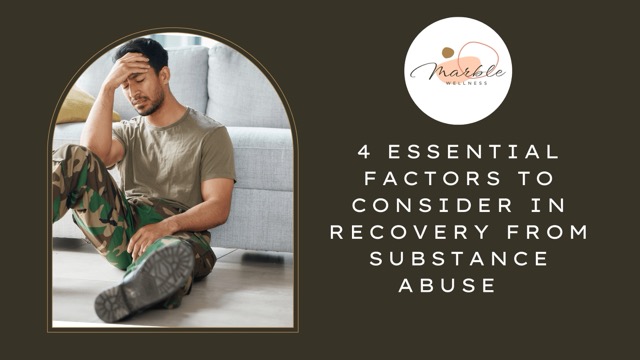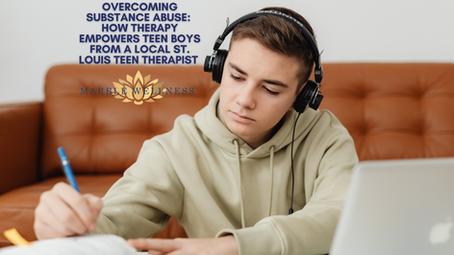Hi there, readers! I’m Skyler Martin, a West County therapist at Marble Wellness in St. Louis, MO. I specialize in working with individuals struggling to get or stay sober.
Maintaining sobriety can be difficult. Especially if you’ve come to rely on a particular substance to regulate your mood or cope with stress. Because substance abuse impacts every aspect of the human experience, successful sobriety often requires that we address the physical, mental, social, and spiritual factors that have influenced our behavior. Below are some ways that you can engage each factor to improve your journey toward sustained recovery.
1. Physical Health (Biological)
Substance abuse is hard on the human body. In fact, early sobriety may come with unpleasant physiological effects, known as withdrawal symptoms. Addressing your bodily needs is an effective way to ensure your safety and begin building a good foundation for sobriety.
Go to Your Doctor
Schedule a comprehensive exam with your physician and be honest about your substance use. Doing so gives them the opportunity to screen for vulnerabilities. All while providing effective medical interventions that can enhance your recovery efforts.
Exercise (seriously)
Substance use is a synthetic way to provide your brain with pleasure and to flood your nervous system with “feel-good” chemicals (dopamine). Finding an alternative way to experience pleasure is essential for stress relief and overall health. By starting a regular exercise routine, you can begin habituating your body to look for pleasurable sensations that are not connected to the use of substances.
Prioritize Sleep
Substance use can have a devastating impact on sleep quality. Regaining quality rest can give you fresh momentum and improve your ability to make value-based decisions. Seek to improve the quality and quantity of your sleep to give yourself the best shot at successful recovery management.
2. Emotional Health (Thoughts + Feelings)
Our thoughts, feelings, and behaviors are all interconnected. By addressing our internal emotional process, we can begin to undo the habitual patterns of thinking, feeling, and behaving that often result in ongoing relapse.
Substance Abuse Therapy
If you want to begin addressing unhelpful patterns of thinking, as well as overwhelming emotional experiences that often trigger your cravings, seek out a well-trained therapist. In the context of a warm and safe relationship, you can begin untangling the beliefs that have sabotaged your previous attempts at success, while identifying your deepest values.
Self-Help
Seeking to improve yourself by reading good books, listening to podcasts, or exploring a neglected hobby are important ways to gain momentum in recovery. Engaging these resources can help you stack up skills to sustain a meaningful life without drugs or alcohol.
Coping Strategies
Begin building a customized list of actions you can take when you feel most triggered toward relapse. Only write out actions you would be willing to do when you’re feeling immense stress or temptation. Whether you practice deep breathing, listen to your favorite album, or go for a run, what really matters is that the strategies you identify match your personal temperament.
3. Social and Environmental Wellness
As human beings, all our behavior takes place within relationships. By engaging our family, friends, culture, and environment, we can begin to address unhelpful influences that lead us away from sobriety.
Addiction and Recovery Groups
Because addiction thrives in secrecy and isolation, one of the most effective ways to find success in recovery is to locate a recovery group in which you can begin sharing your experience with others who can relate. As you begin making connections with individuals who have experienced similar addictive patterns, your feelings of isolation will decrease, and your support system will grow.
Friends and Family
Family relationships and friendships may begin to change as you make decisions that are most conducive to your recovery. Whether it means that you now seek out friends that are strictly sober, or that your current friends understand and support that you no longer utilize drugs or alcohol, revising your relationships with your recovery in mind is vital.
Mentor/Sponsor
The role of a sponsor or mentor figure has been a key aspect of the 12-step movement, and for good reason. By locating someone you can call at any time and share your most difficult struggles with, you can practice a level of trust and vulnerability that was likely absent from the isolation of past substance abusing behaviors. Ideally, this person would be in recovery themselves (though they don’t have to be) and can offer regular support and experiential wisdom.
4. Sense of Purpose (Spiritual)
A final factor that will deeply impact your recovery is your spirituality. This does not necessarily indicate a religious belief or practice (though it can) but relates to your sense of purpose or the discovery of personal meaning.
Spiritual Practice
Finding a routine or practice that connects you to your deepest values can provide a sense of intrinsic motivation that fuels recovery. Prayer, gratitude, mindfulness, attending a religious service, or any number of spiritual practices can help anchor your experience, especially when facing cravings or intense stress.
Volunteer
Getting out of your own struggle and helping alleviate someone else’s is an incredible way to break the cycle of substance abuse. The founder of AA, Bill Wilson often shared that he could only stay sober by helping another person stay sober. By increasing your connection to the needs and suffering of others, you can experience growth and healing that you may not find otherwise.
Start Substance Abuse and Recovery Counseling in St. Louis
If you are eager to revise your relationship to substances, begin by adjusting these physical, emotional, social, and spiritual aspects of your life toward your long-term goal of recovery. Substance abuse and recovery counseling in our West County, MO therapy office is easy and convenient. If you’d prefer to do online therapy in Missouri from wherever you are in the state, that’s fine too! Reach out today to get started with me. I’m part of the therapist team at Marble Wellness, with years of experience working in the substance abuse field. I’m ready to work with you to overcome the challenges you’re experiencing.
Contact Us!

Additional Counseling Services at Marble Wellness in St. Louis, MO and Chicago, IL
Counseling services are designed to help set you on a path of living a more fulfilled, calm, and happy life.
St. Louis
Our St. Louis team of therapists has a variety of training backgrounds and areas of expertise. We specialize in anxiety, depression, grief, chronic illness, therapy for men, couples, and maternal overwhelm. Our practice also helps new moms with various postpartum concerns, moms in the thick of parenting, and moms with teens. We can also chat from wherever you are in the state with online therapy in Missouri and online therapy in Illinois. No matter where you are in your journey, we would love to support you.
Chicago
Our Chicago team of therapists offers a wide range of mental health services to help our clients through the different challenges and hurdles in their lives. In addition to anxiety, depression, grief, therapy for men, and maternal overwhelm, we specialize in professional burnout, therapy for breakups, and love partnering with working moms.



